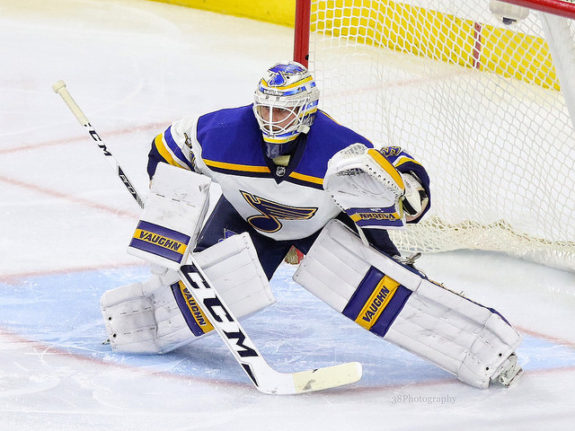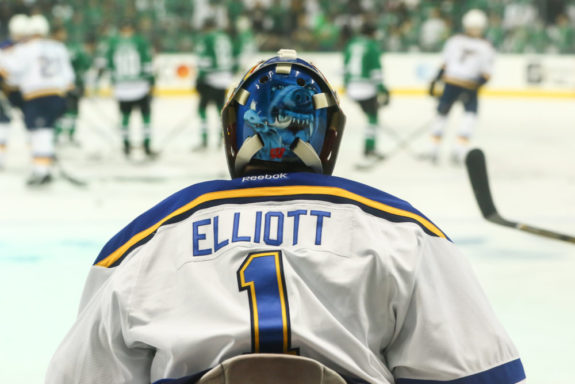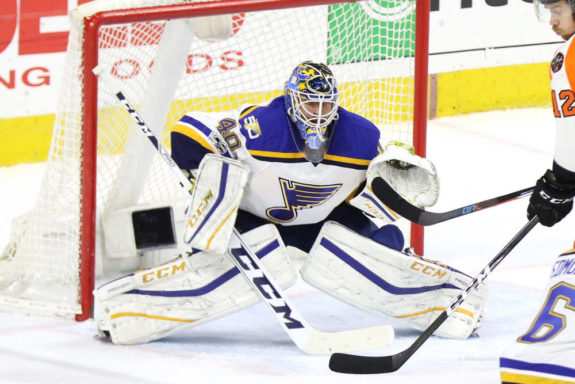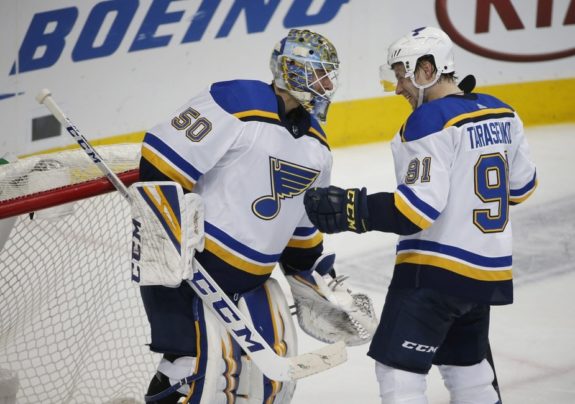![]()
After 255 games and over a decade in the organization, Jake Allen’s tenure with the St. Louis Blues is all but officially over. No, he hasn’t been traded, waived, or released, but the team’s goaltending decisions over the past month have sent a clear message that they are done giving their long-tenured net minder second chances.
Jordan Binnington is now the Blues’ starter, but whether they stick with him or look at other options in the offseason, the chances that Allen is even on the team next season are slim-to-none. With that in mind, let’s take a look at the era that was and no longer is.
Allen Was the “Goalie of the Future”
When the Blues selected Jake Allen at No. 34 in the 2008 NHL Draft, he immediately became the team’s goalie of the future. With one exception (Marek Schwarz at No. 17 in 2004), the Blues hadn’t invested in a goaltender that high in the draft since 1975. But they believed in Allen, thanks in no small part to an incredible performance for Team Canada at the 2008 World Junior Championship Under-18 tournament.

Allen became the primary goaltender for Team Canada, and played incredibly well. He stopped 99 of 102 shots in the final three games of the tournament and was perhaps the biggest factor in Canada bringing home gold. That, coupled with a productive season with the St. John’s Fog Devils of the QMJHL, convinced the Blues that Allen was their man.
For the following four seasons, the Blues groomed Allen in juniors and the minors. He debuted in the NHL in the 2012-13 season, but would return to the AHL the next season, where he would win AHL Goaltender of the Year. Thereafter, he would remain an NHL goalie, and form tandems with a variety of partners, the first and most successful of which was with Brian Elliott.
The Golden Era: Elliott and Allen
In his first full season with the Blues, Allen showed fans why he had been so highly rated as a prospect. He started 32 games and went 22-7-4, an impressive winning percentage of 66.7 percent. He had a .913 save percentage (SV%), a 2.28 goals against average (GAA), and recorded four shutouts. It was enough to earn him 10th place in the Calder Trophy voting despite playing in so few matchups.
The reason Allen was relegated to so few matchups was because of the dominant play of his partner Elliott, who had one of the more impressive, though improbable, Blues’ tenures of all time. In that season, Elliott went 26-14-3 in 45 starts. (For those doing math at home, the five other games that season were started by Martin Brodeur in his brief tenure with the team, but that’s a story for another time). Elliott’s numbers were equally impressive, with a .917 SV% and a 2.26 GAA.

Such was the story of Allen’s first two seasons with the Blues: he was a strong 1-B option to Elliott’s 1-A. If he was ever going to blossom, though, he’d need to stand on his own two skates, and the Blues moved to give him that opportunity by trading Elliott to the Calgary Flames at the 2016 Draft. To make it clear that Allen was the true starter, the team signed career backup Carter Hutton to take Elliott’s place.
Overshadowed by Hutton
Unfortunately for the Blues’ front office, the best-laid plans of mice and men often go awry. In this case, they went awry because Hutton outperformed Allen for much of his tenure on the team, save for Allen’s incredible performance in the 2016 Playoffs against the Wild.
Hutton finished two seasons with the Blues with a 30-15-5 record in 62 games played (many of those in relief of Allen, as Hutton had only 47 starts). He had a .923 SV%, a 2.23 GAA, and seven shutouts. He recorded a quality start 63.8 percent of the time during those two seasons as well.

This contrast was at its starkest during the month of January. In back-to-back seasons, Allen was a ghost in that month. In January 2017 and January 2018, Allen combined for a 1-6-0 record, with an .845 SV% and a GAA of 4.38. In his career, Allen is 6-10-1 in January, and has a .875 SV% and a 3.32 GAA.
At the end of Hutton’s tenure, it was clear who was the better goalie. But the Blues were backed into a corner due to the four-year, $17.4 million contract extension to which they had signed Allen shortly after trading Elliott. The deal was unmovable, and with Hutton demanding a starter’s salary on the open market, the team lost him to the Buffalo Sabres.
Johnson Collapses, Binnington Arrives
In one of the more questionable decisions of general manager Doug Armstrong’s tenure, the Blues’ “backup plan” entering the season was Chad Johnson, a career backup coming off a horrible season in Buffalo. Even so, there was a brief period where it looked as if Johnson would overtake Allen and be the third consecutive goalie to knock him out of the starter’s net, but that thought faded quickly.
In December, the Blues decided to make yet another goaltending change, and waived Johnson. He was claimed by the Anaheim Ducks. They then called up Binnington, a 25-year-old AHL goaltender who had never made a start in the NHL. It would be almost a month before Binnington would get an opportunity to start, but once he did he would not look back.

Since his first start on Jan. 7, Binnington has started eight of the Blues’ 11 games. In that time, he’s gone 6-1-1, with a .933 SV%, a 1.63 GAA, and one shutout, in his debut. All but one of those eight starts has been quality. Compared with Jake Allen’s 15-15-4 record, his .897 SV%, and his 3.04 GAA on the season, it’s easy to see why the Blues have turned so decisively to Binnington. But that decision still has deep significance for the team’s future.
Allen is the Goalie of the Past
Binnington’s swift replacement of Allen is, realistically, the final nail in the coffin of the latter’s relationship with the Blues. He has had too many chances, too many disappointments, and been replaced by too many goalies for the organization to tell its fans they plan to make him the starter again.
There are two major questions going forward: how will the Blues offload Allen, and who will be his permanent replacement? As to the first question, the team has two options. They can try to trade Allen, but that won’t be easy. Armstrong will likely have to offer additional assets in prospects or draft picks to get it done, and even then, he may not find a team willing to take on Allen’s remaining contract. Alternatively, they can buy Allen out, which will greatly lessen the cap hit, but extend it two more seasons.
Here's what it would cost the #stlblues to buyout Jake Allen's contract at the end of the season.
"for educational purposes"https://t.co/gXeERpZTyT
— Corner Taken Quickly ORIGI (@CrnrTknQckOrigi) January 9, 2019
As for Allen’s replacement, it’s too early to say the Blues can commit to Binnington going forward. He’s been great, but he hasn’t yet started ten games in the NHL. The offseason offers two strong options in free agency: Sergei Bobrovsky and Semyon Varlamov. Will the Blues look at either of the Russians to form their future in net? Or will they look for a cheaper option to buy time until they can be certain about Binnington, or until top goaltending prospects Ville Husso or Evan Fitzpatrick can blossom?
In either case, St. Louis simply has to cut ties with Allen before next season. He’s been the goalie of the future for over a decade, but that future is now, and it’s turned into a dystopia. Every goalie the Blues have brought in has outperformed him, and the team has run out of excuses to keep giving him chances. It’s time for the Blues to move on and try to find a new future.